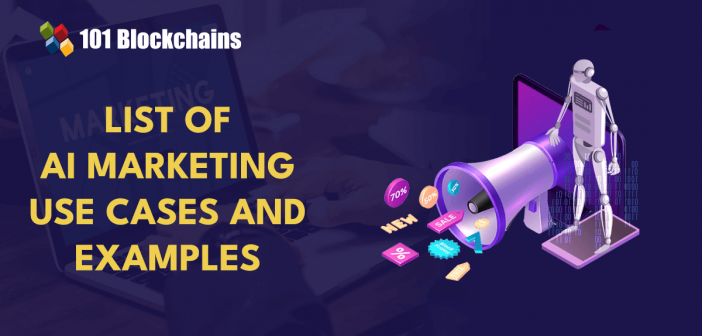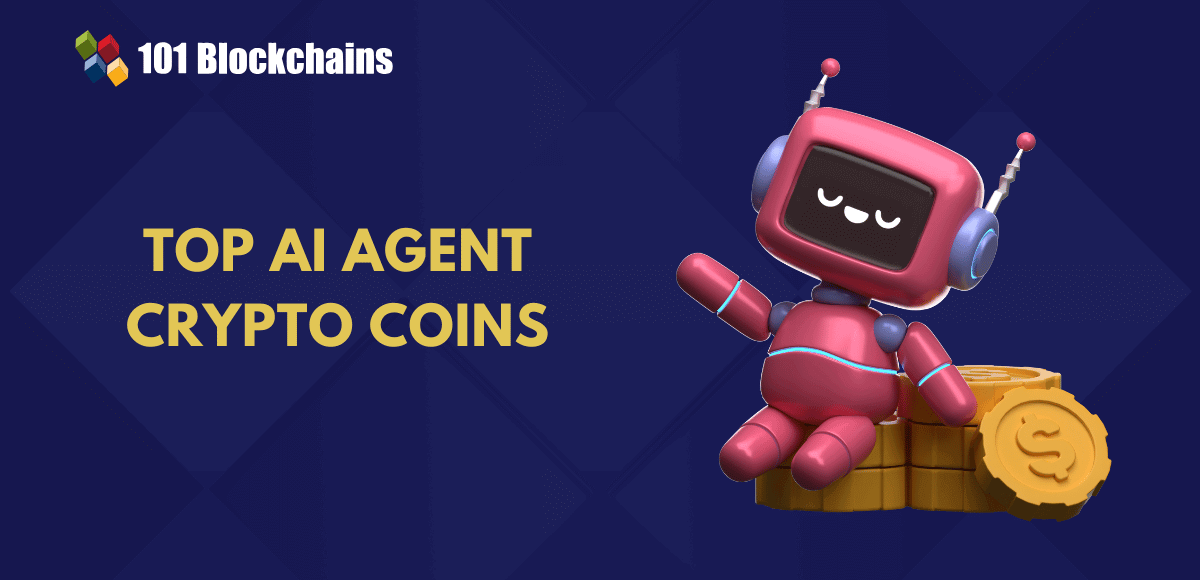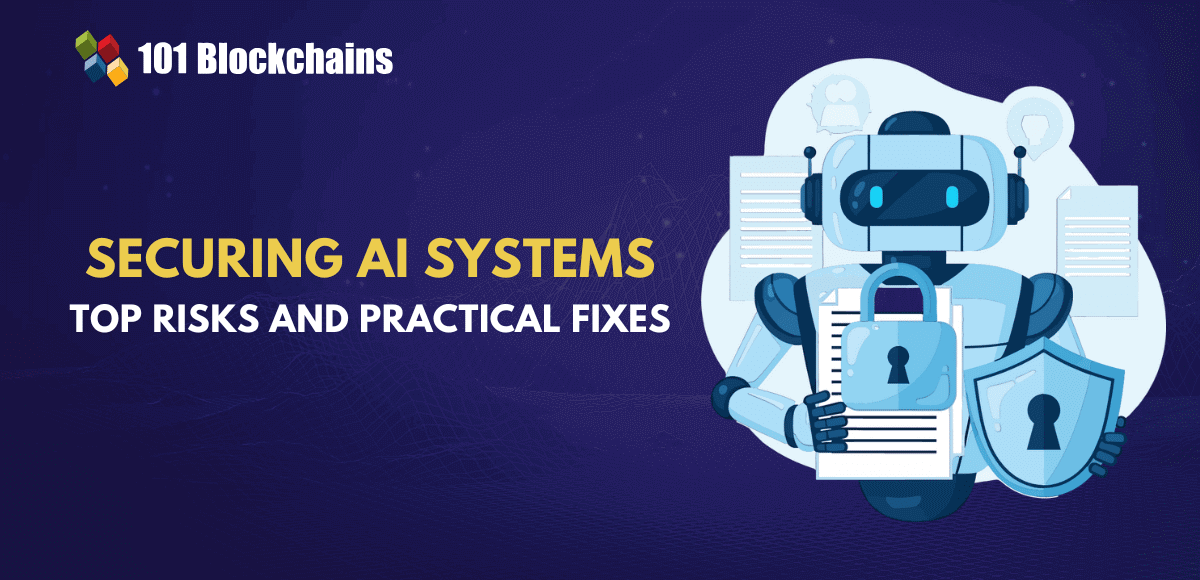Learn how blockchain truly works, master key definitions, and uncover what makes smart contracts so "smart." Dive into the fundamentals, gain valuable insights, and start your blockchain journey today!

- AI & ChatGPT
Georgia Weston
- on October 20, 2023
10 Real-Life AI Marketing Use Cases and Examples
Artificial intelligence might have been one of the notable elements in popular culture a decade ago. On the other hand, artificial intelligence has turned into a major force for digital transformation. Do you ever think about what the Terminator would do as a marketing professional in 2023? The use of AI in marketing is one of the top examples of the ways in which artificial intelligence could transform everyday lives.
According to McKinsey Global Institute, the applications of AI in marketing and sales functions across different industries would contribute around $1.4 trillion to $2.6 trillion in terms of economic impact. Furthermore, Salesforce has also confirmed that around 84% of marketing leaders used AI in 2020. Apparently, the value of AI in marketing might reach almost $108 billion by 2028. Is the hype about AI in marketing real?
The sporadic growth of the global AI market is visible in the use cases of artificial intelligence in popular technology-based solutions. Some of the top examples of artificial intelligence in business operations point to the ways in which it transforms customer service and brings the advantages of automation. Therefore, marketers are obvious candidates for adopting artificial intelligence as a crucial tool for reaching customers across different stages of the customer journey. Let us learn more about AI marketing use cases and examples.
Want to develop an in-depth understanding of large language models and prompt engineering techniques? Enroll now in the Certified Prompt Engineering Expert (CPEE)™ Certification
How Can You Implement AI in Marketing?
The applications of AI in marketing focus on the implementation of machine learning, natural language processing, deep learning, and different AI technologies for solving crucial marketing challenges. Before you review the most popular AI marketing use cases and examples, it is important to learn how to implement AI in marketing.
The popularity of artificial intelligence tools like ChatGPT has become one of the prominent reasons for using AI in marketing. At the same time, it is important to learn about the value benefits of implementing artificial intelligence for marketing. Here are the different types of advantages of AI in marketing.
-
Automation Benefits
The foremost way to implement AI in marketing focuses on automation, which ensures efficient usage of time and budget. How? The benefits of AI in marketing through automation would help in creating marketing content. For example, ChatGPT could serve as an AI chatbot for addressing customer support queries. Automated content generation through generative AI could eliminate the necessity of manual work, thereby saving the budget and time for marketers.
-
Source for Innovation
The best practices for using artificial intelligence in marketing also point to the innovative aspects of AI. If you want to know how to use AI in marketing, then you must tap into the power of AI to encourage innovation. AI could help marketers discover new ideas and creative concepts for marketing content. On top of it, businesses could leverage artificial to learn more about customer insights, thereby ensuring relevant marketing campaigns.
-
Personalization in Content
The use cases of artificial intelligence in marketing also emphasize the development of personalized content. Generative AI tools utilize a combination of machine learning algorithms, data analysis, and natural language processing for creating personalized content.
The outline of popular AI in marketing examples can help you understand how AI helps in the accurate analysis of consumer behaviour and interactions with a brand. As a result, AI could help in expanding the reach of marketing campaigns through targeted social media posts and emails.
Enroll in our Certified ChatGPT Professional Certification Course to master real-world use cases with hands-on training. Gain practical skills, enhance your AI expertise, and unlock the potential of ChatGPT in various professional settings.
How Have Businesses Implemented AI in Marketing?
The ideal approach for understanding the significance of AI in marketing involves studying the use cases of AI in marketing. Many renowned companies such as Alibaba, Amazon, Google, and Apple use artificial intelligence in different ways. Let us take a look at some of the most popular use cases of artificial intelligence in marketing with examples.
1. Netflix
The most popular example of using AI in marketing is Netflix, which marks the importance of AI in entertainment industry. It sets a benchmark for how to use AI in marketing with the advantages of personalization. Netflix has always been at the forefront of marketing with its distinct strategies.
The streaming giant claims that it uses AI to review the type of content watched by customers. It also uses AI to process data about the customer’s interactions with the streaming service. The AI helps in collecting data alongside recommending TV shows and movies. On top of it, Netflix also personalizes the artwork on the box art for different titles according to the user’s behavior.
Does AI marketing help Netflix? The recommendation engine of Netflix is worth more than $1 billion annually, which implies how artificial intelligence helps Netflix. Such types of examples of artificial intelligence in business marketing show that you can also experiment with personalization through AI. The notable tools for personalization with user data include Evolve AI, Dynamic Yield, Optimizely, and Kameleoon.
2. The News Movement
The News Movement is a media platform that aims to expand its audience base alongside ensuring improved engagement. Artificial intelligence helped the platform in diving deeper into data about its audience. The Sprinklers Unified-CXM, used by The News Movement, leverages AI for extracting customer data throughout different platforms.
It shows one of the most practical AI marketing use cases and examples for social media management. The News Movement utilized AI to understand every detail of the customer intent. The media platform used the AI-powered tool for better engagement with their target audience within 6 months. Most important of all, AI helped The News Movement in extracting historical data of users from TikTok.
Social listening is one of the most promising examples of the use of AI in marketing, as it helps in understanding the target audience better. The example of The News Movement shows that AI-powered social monitoring could empower marketing initiatives. Some of the popular tools for social monitoring using AI include Meltwater, Emplifi, and SentiOne.
Want to learn about the fundamentals of AI and Fintech? Enroll now in AI And Fintech Masterclass
3. FARFETCH
FARFETCH is a popular name in luxury fashion retail, and it utilizes AI in marketing for brand language optimization. The retailer helps in tailoring its brand communication with its millions of users. FARFETCH provides a glimpse of the benefits of AI in marketing by using an AI-powered tool for generating brand content.
It has collaborated with Phrasee, which offers the benefits of optimization at scale and enterprise-grade controls. The luxury fashion retailer utilizes the tool for testing different phrases, words, styles, and tones to identify the language which matches the preferences of their audience. FARFETCH used this strategy for personalizing email marketing campaigns.
The applications of Phrasee for managing their email marketing content helped FARFETCH in achieving better results. As a matter of fact, the luxury fashion retailer achieved a growth of 38% in average click rate. You can notice an innovative approach regarding how to use AI in marketing with such examples.
Artificial intelligence can help in capturing the unique brand voice of a business and ensures consistency of marketing messages. Brand language is an important aspect of the communication of a business with its target audience, and AI could help in achieving consistency in brand messaging.
4. JP Morgan Chase
The use cases of artificial intelligence in marketing also point to the example of JP Morgan Chase, a prominent name in banking. It realized that AI could create better copies than humans. The company entered into a collaboration with Persado to generate copies with higher click rates.
According to the Chief Marketing Officer of JP Morgan Chase, the technology of Persado has delivered promising results. The company witnessed a growth of 450% in CTRs on advertisements with the help of AI. Copywriting is one of the major aspects of marketing, and AI use cases in marketing could automate different writing tasks.
Want to understand the importance of ethics in AI, ethical frameworks, principles, and challenges? Enroll now in Ethics Of Artificial Intelligence (AI) Course
5. Volkswagen
Another popular name among AI in marketing examples refers to Volkswagen. It utilizes the value of predictive analytics through AI for automation of decisions about purchasing ads. Volkswagen recognized that the ad agency they worked with offered personal perspectives about ad purchasing decisions. Therefore, marketers decided to choose AI to save costs by investing less in campaigns alongside increasing their sales.
The advantage of better and more accurate forecasting of buying decisions helped Volkswagen in cutting hidden costs by the media agency. In addition, the brand experienced a 20% rise in sales at Volkswagen dealerships. Volkswagen provides an effective example of using AI in marketing to cut down on marketing costs. You can also use AI tools like Tableau and IBM SPSS for data analysis to optimize marketing spending decisions.
6. Nutella
Nutella provides a glimpse of another use case of AI in marketing by creating a new packaging design. The brand wanted to have a distinct identity with its packaging that would make its products more appealing. It contracted a branding agency, Ogilvy Italia, which employed the use of AI in marketing to create unique labels.
The branding agency generated 7 million unique labels which expressed the tastes and emotions of Italian people. Interestingly, Nutella achieved an amazing feat as the 7 million jars manufactured in the campaign disappeared from stores within days.
Artificial intelligence tools such as DALL-E and Midjourney could help in creating designs for brands, including logos and packaging design. Considering the fact that design is one of the core elements for success in marketing, AI-powered tools could improve the performance of marketing campaigns.
7. Cosabella
Another popular example of the use cases of AI in marketing in the retail apparel and fashion industry is Cosabella. It shows the benefits of AI in marketing for the apparel and fashion industry for personalizing social media content. Social media advertising has become an important part of marketing strategies of all brands. Cosabella introduced AI in its marketing function and removed the need for communicating with its branding agency.
The brand used an AI algorithm, Albert, for paid search and digital marketing initiatives through creative content and KPIs offered by the brand. With the AI takeover, Cosabella registered a formidable growth in performance of its marketing strategies. The returns on ad spend increased by almost 50% and reduced the ad expenditure by 12%.
Identify the true full potential of generative AI in business use cases and become an expert in generative AI technologies with our Generative AI Skill Path.
8. Tomorrow Sleep
Tomorrow Sleep is a mattress company that has utilized AI to improve content marketing initiatives. The startup has set a perfect example of how to use AI in marketing by generating organic traffic. The brand utilized an AI-based tool, MarketMuse, for comprehensive research alongside generating impactful content, which led to more traffic.
Tomorrow Sleep gained promising growth in organic traffic and also booked a spot on the featured snippet of search engines. The potential of AI-powered tools for content marketing provides another reason for using artificial intelligence in marketing.
9. Whole Foods
The list of examples and use cases of artificial intelligence in marketing also includes Whole Foods. Almost 36% of consumers perceive personalized experiences as a powerful tool for brand marketing. The grocery retailer Whole Foods introduced 24 Just Walk Out stores throughout the US, equipped with sensors and cameras.
It provides one of the most innovative examples of artificial intelligence in business branding through personalized customer service. The primary objective of the strategy focuses on data collection by tracking all purchases at individual levels. As a result, the brand could analyze shopping activity for identification of patterns and generate predictions for future behavior.
10. Mastercard
The final addition among the popular examples of implementing AI in marketing is Mastercard. The Mastercard Payment Gateway Services had to encounter constant challenges during the pandemic. Therefore, MPGS selected an AI-powered platform, Crayon, for obtaining a perspective of competitors to offer accurate predictions of potential threats.
Crayon showcases a glimpse of AI marketing use cases and examples where businesses could evaluate the business environment from an external perspective. In addition, it also shows that you can use AI to encourage open dialogue, where everyone can participate in conversation.
Develop expert-level skills in prompt engineering with the Prompt Engineer Career Path!
Bottom Line
The different use cases and examples of AI marketing prove that brands have recognized the potential of AI. Artificial intelligence is evolving continuously, and the use of AI in marketing could establish new benchmarks for performance. AI, machine learning, deep learning, natural language processing, and computer vision technologies can transform different aspects of marketing functions.
As popular brands encourage the applications of AI in blockchain, new startups could also follow the same path. Start learning more about the working of AI and how AI technologies could offer value advantages in marketing.





